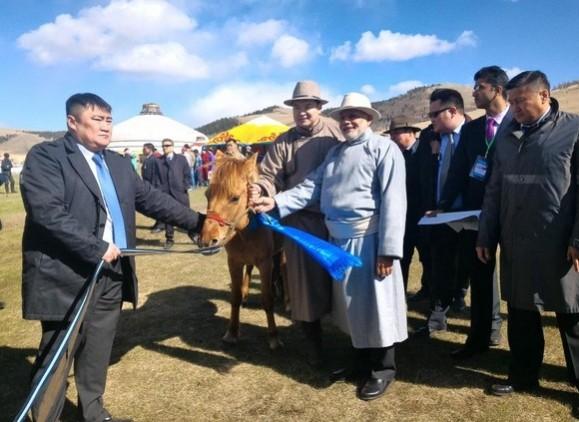
At a time when the Chinese have challenged India in South Asia by stoking fire in the Sikkim sector, a new development has happened in China's north and New Delhi should take full cognizance of the fact to redraw a fresh strategy to hit back at the Dragon.
On June 26, the presidential election was held in Mongolia, a country sandwiched between Russia and China, and the pro-Russian candidate in Khaltmaagiin Battulga emerged winner.
A former sumo champion, Battulga is also known for his anti-China ideology and in his very first presidential address held on Monday, June 10, the 54-year-old said he wanted his country to follow a more pragmatic foreign policy instead of remaining over-dependent on the Chinese as has been the case since the fall of the erstwhile Soviet Union, which once had a bigger clout in the landlocked nation.
In an interview in 2014, Battulga had expressed his suspicion over China's growing economic influence in Mongolia and said the resources of Mongolia would be finished in 40-50 years and a conflict between the Chinese and the Mongolians would become inevitable.
New Mongolian President Battulga is looking for new friends in US & Japan
Battulga also said he wanted Mongolia to get closer to countries like US and Japan, both known to be China's foes and also build the country's economic capacity. The nationalistic tone heard in the speech of the new Mongolian president is a big strategic opportunity for India to pay the Chinese back in their own coins.
India, however, needs to erase the story of Nov-Dec 2016
However, India has to be very careful about its strategy to include Mongolia in its scheme of things to counter China. In December 2016, Beijing had forced out an apology from the Mongolians after the latter had hosted the Dalai Lama – the Tibetan spiritual leader – the month before. Mongolia had assured the Chinese that it would not welcome the Dalai again on its soil and bolstered by this, the Chinese media had warned India also not to hobnob with the Dalai issue and Tibetan sentiments much.
The Mongolians had also urged India to publicly object to China's act of arbitrarily introducing border tariffs as a consequence for inviting the Dalai Lama. However, an apprehensive India chose to steer clear of the Mongolia-China spat saying the problem was more about debt-servicing. The Ministry of External Affairs did its bit saying it was sympathetic towards Mongolia's problems knowing fully well that dry sympathising doesn't mean much when it comes to the harsh reality of international politics.

Prime Minister Narendra Modi had made a significant visit to Mongolia in May 2015 as a continuation of New Delhi's strategy to corner China by winning hearts of its other neighbours that it dominates. He was, in fact, the first-ever Indian PM to visit Mongolia and it was expected that things between New Delhi and Ulan Bator will see a quick concretisation. But in effect, it did not.
The humiliation that Mongolia faced from the Chinese over the Dalai Lama visit and India's indifference towards it was enough to convince Ulan Bator that New Delhi is not really ready to see beyond the immediate no matter what Modi says. India had a golden opportunity to fill in the shoes of the 'third neighbour' that Mongolia has been so eagerly looking for to help it add a new dimension to its foreign policy but it was squandered.
Modi, during his visit to Mongolia (he had gone there from China), had announced a credit line of $1 billion and also promised the latter support in diverse sectors and a rise in exports. His symbolic gesture of posing with a bow and arrow was seen as a strengthening link between the two democratic countries against communist China. The Mongolians were logically impressed with the pledge for it would boost its economic fortunes. After all, like Nepal, Mongolia is also sandwiched between two big countries and has to constantly play one card or another to secure its own interests.
If China can play Nepal card, India should play Mongolia card
Mongolia is perhaps more unfortunate than Nepal because of late, the Chinese and Russians have come together for geopolitical and strategic reasons and that restricts Ulan Bator's scope of manoeuvrability in foreign affairs even more.
PM Modi's visit was seen by the Mongolians as a hope to counter the Chinese influence in their land and it thought India could be an alternative to Russia if China tries to squeeze it more. It even went to the extreme of defying Beijing by welcoming the Dalai Lama but then paid the price. When China slapped a blockade, the Mongolians urged India to provide the money it had promised but India, as reports say, was in inertia.
The MEA spokesman's response was: As a close friend of Mongolia, which India regards as its 'third neighbour' and 'spiritual neighbour', we are ready to work with the Mongolian people in this time of their difficulty. Ulan Bator had little option but to bow before Beijing.
Today, Modi's India has another chance to undo the error and get close to Battulga's Mongolia to strengthen the anti-China front in Asia and divert the attention from Doka La where New Delhi and Beijing have continued to lock horns.
The question is: Will Modi will be that brave to make a foray into China's backyard to meet fire with fire?
















